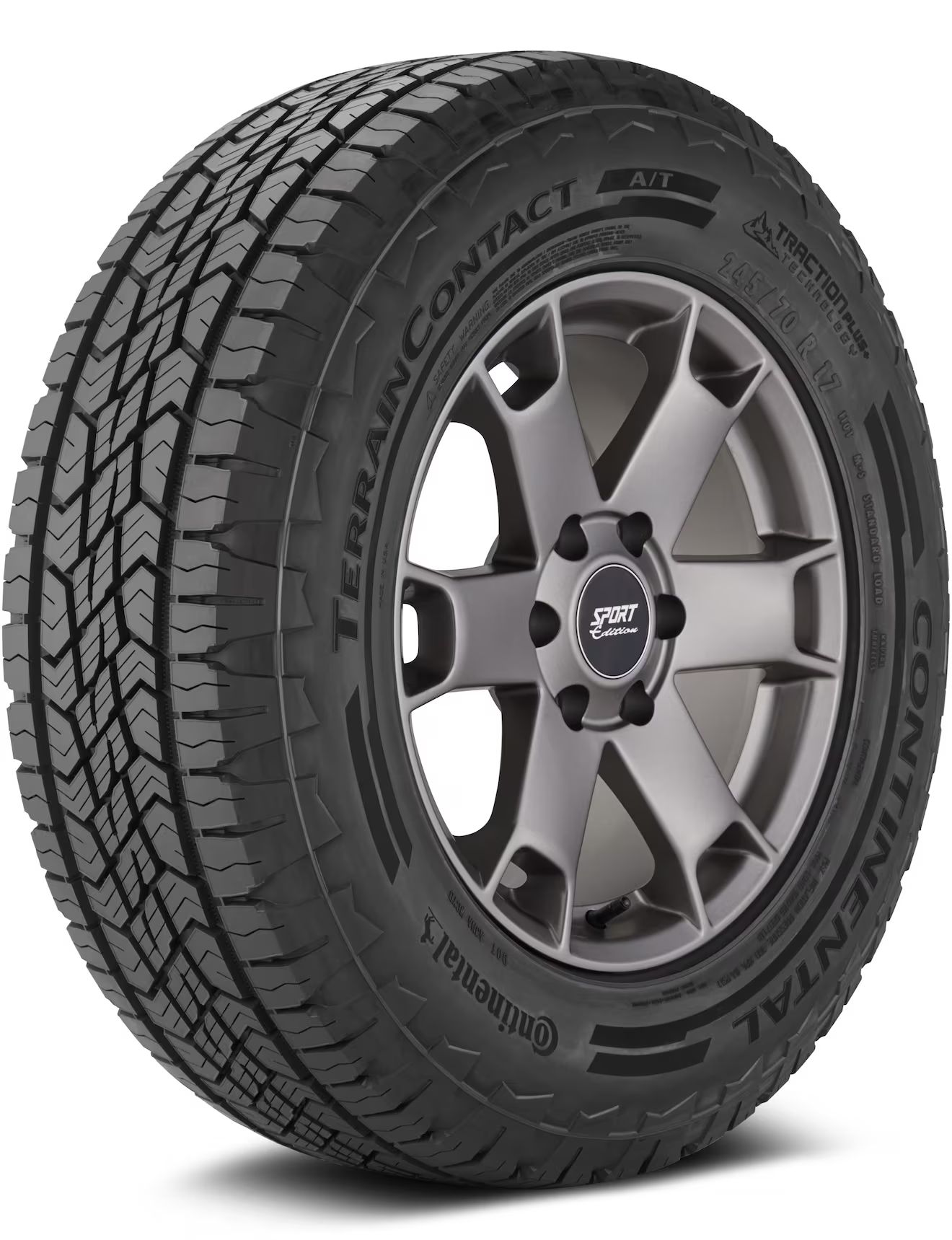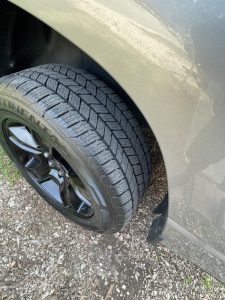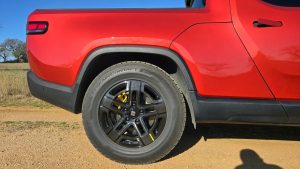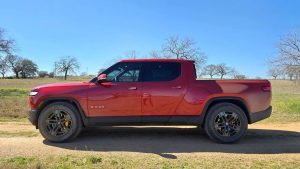The Continental TerrainContact H/T is one of my favorite highway tires since 2019. Well, at the beginning, I felt like it was a bit too squishy for me. It was perfect in rain and snow, no doubt, but when it came to loaded applications — I wasn’t sure. However, years passed, and iteration paid off. Instead of releasing a new model, Continental kept refining the same tire and made it great for almost any use. I love that approach.
Now, it’s easily one of the best in its class, and honestly, there’s not much real competition. Even the new Michelin Defender LTX M/S2 probably needs a couple of rounds of refinement to catch it. In this article, I’ll evaluate, in my point of view, the real legend — Continental TerrainContact H/T — using test data and real customer reviews to get straight to the point. Let’s begin.
Quick Look
Continental TerrainContact A/T

The Continental TerrainContact H/T is still the benchmark in its class. In testing, it stopped about 3% shorter on dry pavement and nearly 5% shorter in wet braking than the Michelin Defender LTX M/S2, while also holding the highest lateral grip at 0.76 g. It is one of those highway tires that feels both planted and smooth, with tight steering, steady feedback, and almost no noise even at highway speeds.
What is more impressive is it manages that performance without giving up comfort. It scored roughly 3% higher in ride quality and ran about 5% quieter than most premium options. Add in proven long-term durability, and it is easy to see why this tire still leads the segment after years on the market. The TerrainContact H/T does everything right and keeps doing it longer.
Best Use Cases
Trucks and SUVs mostly driven on pavement
Drivers who value wet braking and all-weather stability
Middle to mild towing conditions with stable ride under load
Long highway runs or mixed daily driving
Dry Grip & Stability — Feels Firm, Confident, and Predictable
On dry pavement, the Continental TerrainContact H/T sets the standard for how a highway tire should feel. It recorded 0.76 g in average cornering and stopped from 60 mph in 130 feet, leading the group in both stability and braking confidence. You can feel that grip through the steering; it holds a line without that soft delay you get from comfort-biased compounds.
Compared to the Michelin Defender LTX M/S2, which stopped in 140 feet and delivered 0.75 g, the Continental feels a bit firmer and more responsive in quick maneuvers. Well, the good news is, it even has a smoother ride than the Michelin, which makes that result even more impressive. You get both precision and comfort, something most highway tires struggle to balance.
A guy on Reddit said, “These tires make my F-150 feel like it’s on rails. No squirm, no drama, just solid grip.” Another review on Tire Rack summed it up perfectly: “Dry traction is unbelievable for a highway tire — it corners like something sportier.”
From my point of view, this is where Continental nailed it. The TerrainContact H/T feels engineered for drivers who like a steady, locked-in steering feel. It’s firm, predictable, and stays composed no matter how much weight you’ve got in the back.
The Continental TerrainContact H/T is one of those tires that makes driving in heavy rain feel easy. In testing, it stopped from 50 mph in 97 feet, ran a 36.02-second wet lap, and held 0.74 g of cornering grip, which is the best result in its class. That number tells a lot. The tire doesn’t just clear water — it holds traction through the turn instead of sliding out mid-corner. It’s that combination of grip and control that makes it stand out.
Compared to the Michelin Defender LTX M/S2, which stopped in 100 feet and held 0.73 g, the Continental still has the upper hand. It feels tighter on turn-in and more composed when braking hard in standing water. The steering feedback stays linear, and it never feels floaty or nervous. Michelin is solid, but the TerrainContact H/T just gives more confidence when things get slick.
One owner on F-150Forum said, “I’ve hit standing water at 70 and didn’t even flinch — these things just cut through.” Another on Reddit wrote, “Best wet grip I’ve ever had on a truck tire. I don’t even think about slowing down when it rains.” Those comments match the test data perfectly — calm, predictable handling and class-leading grip even when the road is covered in water.
From my point of view, this is the tire that defines wet performance for the category. It grips, it stops, and it does it all quietly. If you want the safest, most confidence-inspiring drive in the rain, this is the one I’d pick.
Winter & Light Snow Performance — Strong for Its Class
For an all-season tire that doesn’t carry the 3PMSF badge, the Continental TerrainContact H/T does an impressive job in cold conditions. In testing, it needed 77 feet to stop on packed snow and about 95 feet on ice — both among the best in its class. Snow lap times and acceleration results put it comfortably ahead of most highway all-seasons, which shows that Continental’s compound doesn’t stiffen up as quickly when temperatures drop.
Compared to the Michelin Defender LTX M/S2, which stopped at 82 feet on snow and 105 feet on ice, the Continental is clearly stronger in both braking and control. The tire feels more connected to the surface, especially in those in-between conditions — slush, frozen rain, or slightly packed snow. You can feel it bite and pull instead of spinning uselessly. Michelin is still the more comfortable one when things get bumpy, but in real traction, Continental wins it clean.
A few user reviews line up exactly with that. A driver on Reddit said, “Didn’t expect much in snow, but these things dig in better than most all-seasons I’ve tried.” On BobIsTheOilGuy, another mentioned, “No drama on icy driveways. Grips like it has claws.” For a non-3PMSF tire, that’s high praise — and it’s consistent across multiple forums.
From my experience, this is about as good as it gets for a standard all-season. The TerrainContact H/T gives you usable winter traction without sacrificing dry comfort or treadwear. For anyone driving in light to moderate snow regions, it’s the most capable tire you can run year-round without switching sets.
Noise & Comfort — The Smoothest in the Segment
If I had to pick one thing that defines the Continental TerrainContact H/T, it’s how refined it feels on the road. In testing, it scored 8.75 for ride comfort and 8.50 for noise, both best-in-class results. You can tell right away how much time Continental spent tuning this tire for daily driving. It’s quiet on fresh asphalt, stays calm on concrete, and absorbs rough surfaces without turning harsh.
Compared to the Michelin Defender LTX M/S2, which scored 8.50 for ride and 8.25 for noise, the Continental actually feels smoother and a little more composed over patchy roads. The steering stays centered, and the suspension doesn’t have to work as hard to keep the ride balanced. It’s that fine-tuned feel you only get from a tire that’s been tested, refined, and retuned instead of being replaced every few years.
Owners say the same thing. One driver on Tire Rack wrote, “It’s so quiet I can finally hear the wind noise over my tires — that’s new.” Another on F-150Forum said, “These feel like a luxury tire. I run them on my work truck, but they ride better than the stock ones on my SUV.” That kind of feedback shows how well this tire balances comfort without going soft.
From an engineering standpoint, this tire nails the sweet spot. The tread blocks are tightly spaced and make small, frequent contact with the road, which breaks up air pulses that usually cause tire hum. The compound itself feels pliable but not mushy, giving the ride a cushioned feel without losing feedback.
If you drive a truck or SUV mostly on pavement and want something that just disappears under you, this is the tire. It’s as smooth as highway tires get, and for long drives, it’s easily one of the most comfortable sets you can buy.
This is where the Continental TerrainContact H/T really proves why it’s been trusted since 2019. It comes with a 70,000-mile warranty for Euro-metric sizes and 60,000 miles for LT sizes, which already puts it among the best in the highway tire category. But what makes it special is how consistently it wears — not just how long it lasts.
Owners who’ve run them for 30–40k miles often say the same thing: “They still look new.” On Tire Rack, several reviews mention perfectly even wear patterns with minimal rotation effort. A user on F-150Forum wrote, “I’ve got 40k on mine, and I’ll easily see 70k. No cupping, no noise increase.” That kind of feedback tells me the carcass construction and tread stiffness are dialed in.
Compared to the Michelin Defender LTX M/S2, Continental doesn’t promise more mileage on paper, but it often holds its feel longer. Michelin tends to harden a bit as it ages, while Continental stays flexible and consistent. That said, Michelin’s stiffer sidewall can be slightly better for heavy-duty towing, where extra rigidity helps keep the rear end more stable under max load. But for everyday mixed driving, Continental’s balance between stiffness and comfort feels more natural.
From my point of view, the TerrainContact H/T isn’t just long-lasting; it’s stable over time. The compound wears slowly and evenly, and the casing resists deformation under load. That’s the difference between a tire that just survives 70k miles and one that actually performs the same way from day one to the end of its life.
If you’re the type who keeps a truck for the long haul and wants to forget about tire issues, this one won’t disappoint. It’s built to last and stay consistent — and that’s what separates good tires from great ones.
Final Verdict — Still the Highway Tire to Beat
The Continental TerrainContact H/T has been around for a while, but honestly, it doesn’t need replacing. Continental kept refining it instead of rushing a new version, and it shows. The tire feels planted, confident, and consistent across every surface — dry, wet, or light snow. It’s quiet, smooth, and wears evenly, which is exactly what most truck and SUV owners want from a daily tire.
Even against newer models like the Michelin Defender LTX M/S2, it still leads in wet braking and stability while matching or beating it in ride comfort. Michelin’s slightly stiffer build gives it a small edge for heavy towing, but for everything else, the Continental just feels more balanced. It’s one of those tires that makes your truck drive better without you realizing why — and that’s what good engineering does.
Best Use Cases
Trucks and SUVs used mostly on highways and paved roads
Daily drivers looking for the smoothest and quietest ride in the category
Light towing and work trucks that still need stability under load
Drivers in mild-winter climates who want reliable rain and snow performance without switching tires
FAQ – Continental TerrainContact H/T
Is the Continental TerrainContact H/T better than the Michelin Defender LTX M/S2?
In most cases, yes. The TerrainContact H/T stops about 5% shorter in the wet and feels tighter in corners with 0.76 g of lateral grip. The Michelin still rides a little softer, but Continental combines that stability with smoother comfort overall.
How does the TerrainContact H/T perform in rain?
It leads the category in wet traction. The tire stays stable in deep water, keeps strong braking performance, and provides confident steering even in heavy rain. Many drivers describe it as “planted” and “unbothered” in wet conditions.
Can the TerrainContact H/T handle snow?
Yes, for light to moderate snow. It stops around 77 feet on snow and 95 feet on ice, which makes it one of the best non-3PMSF highway tires in winter traction. For deep snow or icy regions, a dedicated winter tire is still better.
How is the ride comfort and noise level?
It is one of the quietest highway tires you can buy. In testing, it scored 8.75 for ride comfort and 8.50 for noise. Most drivers say it feels calm on rough pavement and almost silent on the highway.
Is it good for towing?
Yes, for middle to mild towing conditions. It keeps its shape under load and stays stable without adding harshness. If you tow heavy or frequently, the Michelin’s stiffer sidewall might give a small edge in rear stability.
How long does the TerrainContact H/T last?
It comes with a 70,000-mile warranty for Euro-metric and 60,000 miles for LT sizes. Most owners report even wear and quiet performance past 40k miles, with many expecting to reach full warranty life easily.
Who should buy the TerrainContact H/T?
It is perfect for drivers who spend most of their time on pavement and want premium stability, comfort, and wet traction without the premium price. Great for daily trucks, family SUVs, and long-distance commuters.


